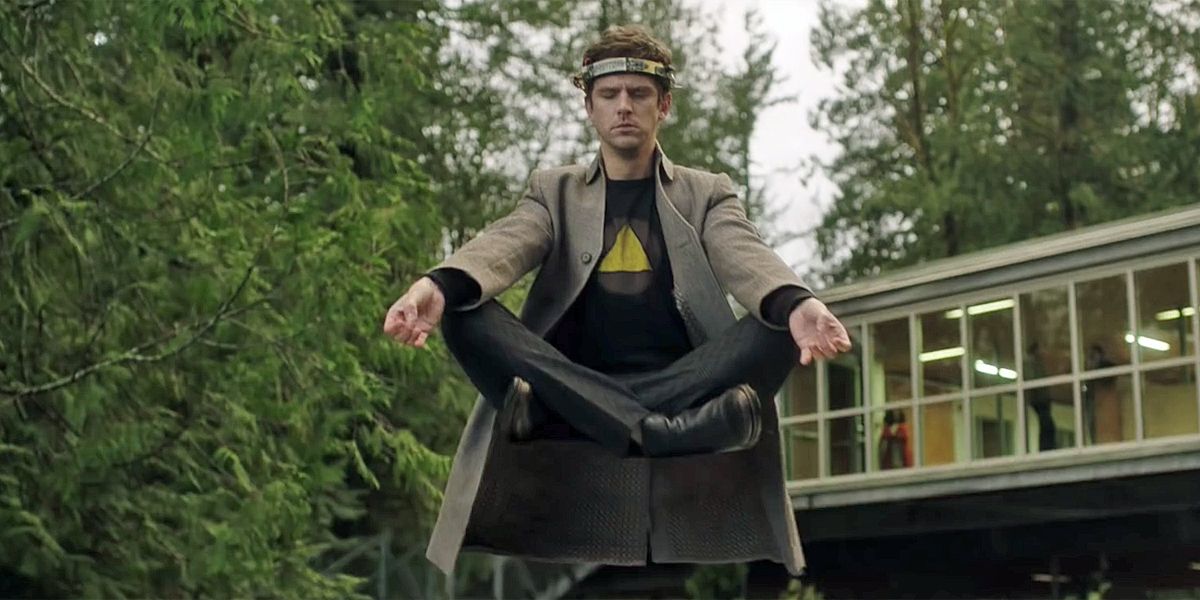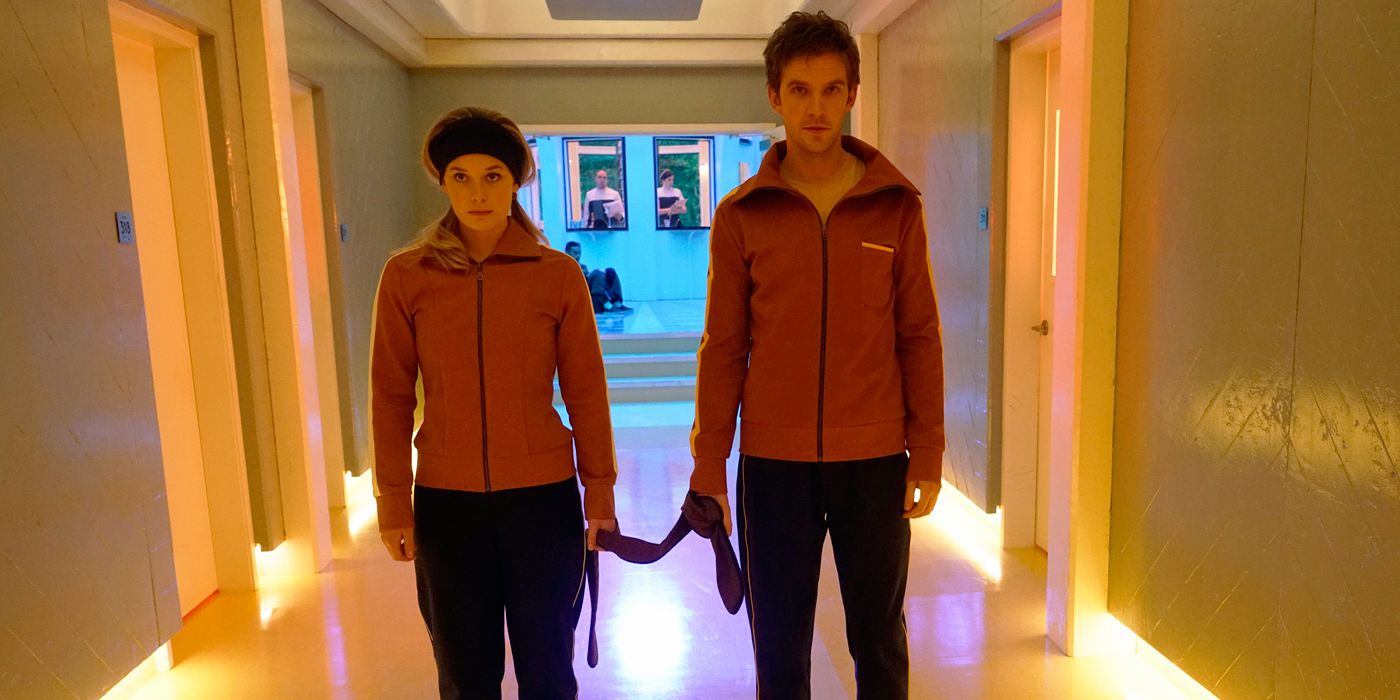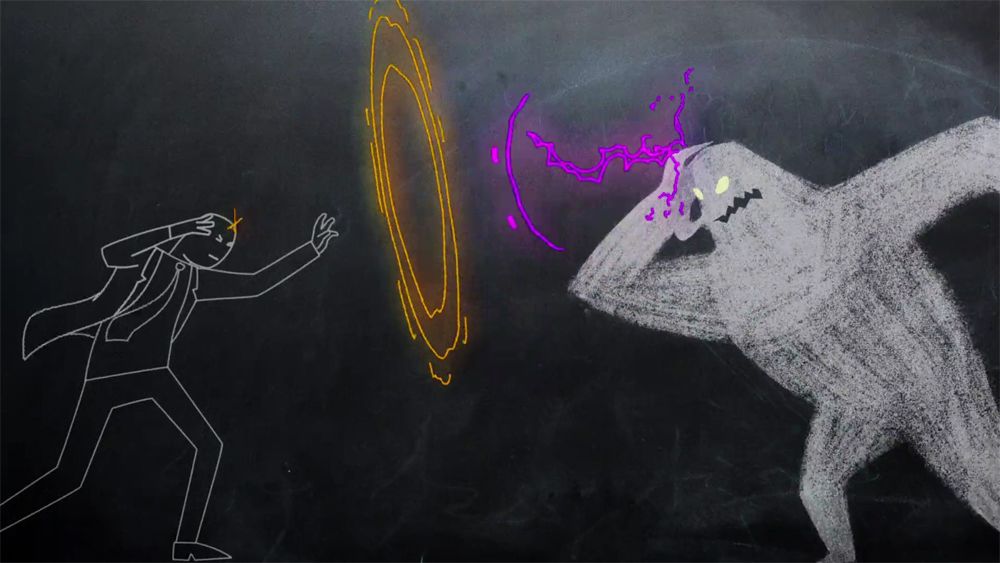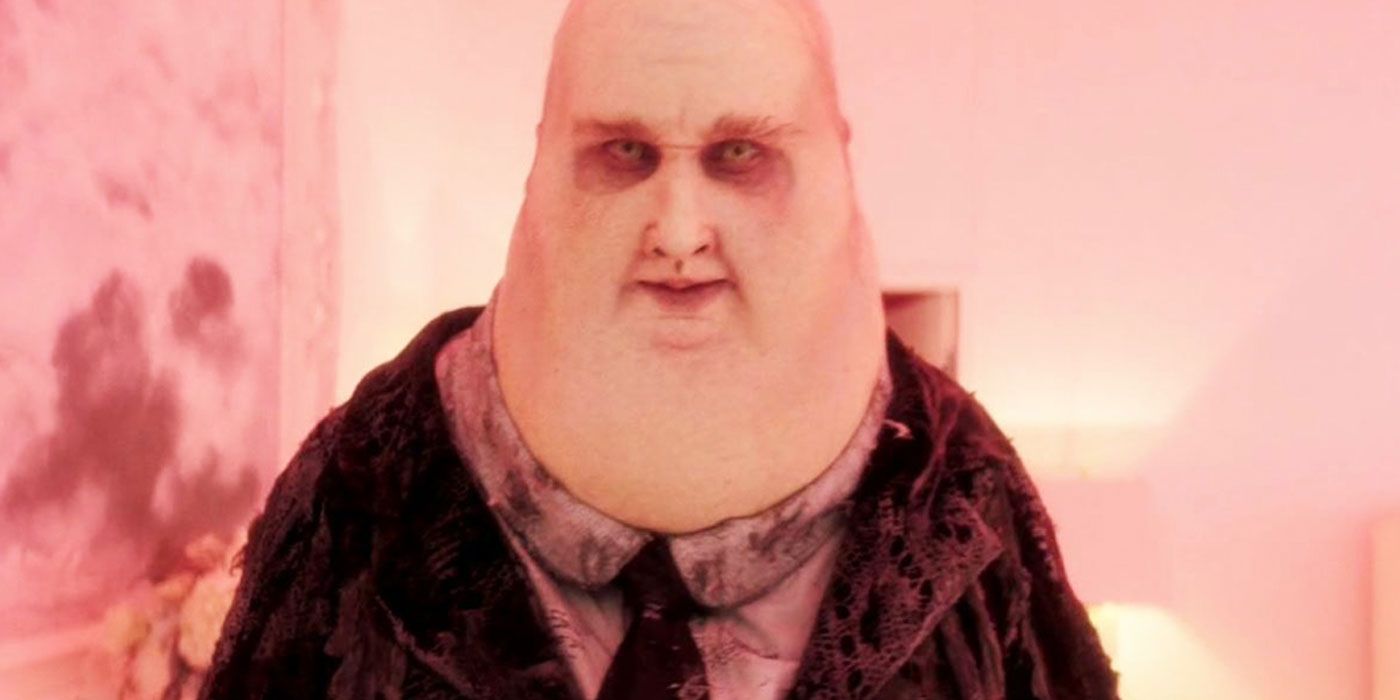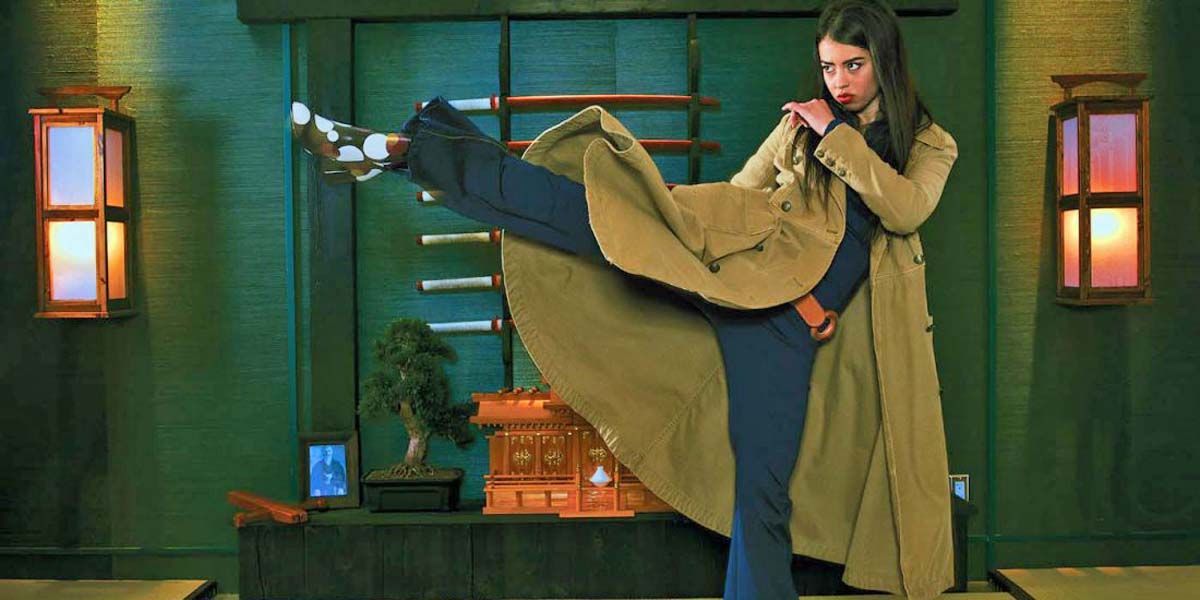After a lifetime hearing voices and seeing visions, and six years spent in and out of psychiatric hospitals, believing he's schizophrenic, David Haller finally knows who, and what, he is: a powerful mutant who's been fed upon since childhood by a malevolent psychic parasite known as the Shadow King.
As the seventh episode of the FX drama "Legion" came to a close last week David (Dan Stevens) and his friends had freed themselves from the entity's clever prison -- a re-creation of Clockworks Psychiatric Hospital -- and a chance at a "normal" life seemed within his grasp, the idyllic Summerland was besieged by the forces of Division 3, led by a disfigured Interrogator (Hamish Linklater) intent on revenge.
RELATED: "Legion" Season 2 Won't "Suddenly Look to the Comics For Storylines"
"Out of the frying pan and into the fire is a pretty good approach to storytelling on some level," series creator and executive producer Noah Hawley told media outlets earlier this week.
Ahead of tonight's Season One finale, Hawley spoke about "Legion's" connections to Fox's larger X-Men universe, the show's creative relationship with time, the links between psychology and mutant abilities, and the unexpected inspiration for the design of the grotesque Devil With Yellow Eyes.
Do you feel you've held yourself back as far as presenting a reality that was only possible versus a fixed reality that you're going to continue with in the next season?
Noah Hawley: Certainly David's origin story is the same as it was in the comics. But, that said, we know even from the movies these last couple of years that the timeline has changed, and that the X-Men have always told stories in sort of alternate universes. So, there's certainly many universes in which Professor X could be David's father. You know, I don't really feel like I've sort of limited myself to present-day America, for example, or I've now lost that ability to sort of make this world its own world, just because we now know who David's father is. I think it's hard to know, going forward -- I certainly don't have it all worked out yet as to what the second season will entail, but I think what viewers responded to about the show was its inventiveness and its sense of emotional grounding, if not literal grounding. I want to continue to deliver something unexpected, and something where the possibilities, if not infinite, are certainly playful.
"Legion" has had a weird relationship with time, at least the concept of it, from the beginning, whether it's in the '60s and '70s fashion and decor, or Oliver Bird (Jemaine Clement's character). Can you talk a little bit about how you approach time in the series?
This is a show that makes the script coordinators crazy, because they're always trying to track the linear dates, and the evolution of it, and it's certainly not that literal. I think time is a tool as a storyteller, and the more grounded we are in the timeline the more linear the story feels, and the less grounded we are the more harder it is, kind of ... It creates a kind of state of mind, I think, and I found after the pilot, in those next episodes -- two, three, four -- that I wanted to start each hour with this sort of montage feel, where what we call the present is a little bit hard to define, Episode Four being the most egregious, where it seems clear that David had been unconscious for a while, because we kept seeing Syd wake up, and there was a little bit of repetition in the images, but there was a sense that time was passing, and it was hard to locate the present until about five minutes into the show, when we finally settled into our first scene.
RELATED: "Legion" Finally Makes That Key X-Men Link We've Been Waiting For
I think there's something to that kind of hallucinatory relationship with time that, if you do it right, it does create a state of mind, and allows the viewer to stop focusing so much on that, and to let the show kind of relax you into its own set of rules and everything. I definitely feel like time is a key element, and the use of time in our storytelling. Otherwise, the minute you get into real time you end up in a world of action, where it's just one action leads to another, leads to another, and then the show becomes an outline, it becomes a plot-driven story, and this is more about characters and ideas.
You kind of tripled down on the connections to the X-Men universe last week. Can we expect more of those, or is that it, is that the nod to kind of found "Legion" in the X-Men world?
I think, as we do with "Fargo," I think fans who are really familiar with the at world, they appreciate certain connections and a sense of being rewarded for knowing the stories so well. But at the same time, my goal was always to sort of use this character as a way to have a conversation and tell a story that was my story, that was interesting to me, and to try to get at the heart of what this character is and [what] this journey is for him, not literally sort of reenacting issues of the comic book, or storylines from the comic book. So, I don't think you'll see the show suddenly look to the comics for storylines, but you may see ideas or characters or images that are familiar to you.
Will the search for the identity of David's father become a larger focal point in Season Two and beyond, and do you envision a world where you one day do put a name to that character in the show?
Any person who learns that they were adopted is going to have those questions and want to seek out those birth parents; I think that's a very natural story. I think certainly where we left David at the end of the first year, that can't be his first priority, but it's certainly, in terms of coming to understand who he is and what his purpose is on this world, I think that's definitely something we're going to approach. It's a creative conversation, but it's also a sort of corporate conversation, you know, on some level, in terms of the movie studio and their relationship to the X-Men and the characters they want in the movies and want to protect, potentially. And were we to want to have Professor X on the show, or even Patrick Stewart on the show, James McAvoy or one of those actors, it's a conversation both with the actor and with the studio. So, I don't know, I haven't really dived into that quandary yet, but certainly I need to start thinking about it.
Have you thought about, ideally, how long you'd like the series to last, or at this point are you just going year by year?
I haven't really planned it out. I mean, I sort of feel like I have a story that I want to tell, but I haven't gamed out, on an episodic basis, how long that is yet. I think there were things about the first season I thought would unfold faster than they did, and things that I thought would take longer that I kind of dealt with rather quickly, so it's hard to know. I think I'll have a better sense at the end of the second year how many more years there are to go than I do right now.
How did you approach the design of the Devil With Yellow Eyes?
It was a conversation that I had with our production designer, Michael Wiley, and he told me that he was obsessed with this reality show, "My 600-lb Life," which I hadn't seen, but I did respond to the idea that whatever was inside David had been feeding on him all this time, and as a result it was something engorged or tick-like about it, that it was feeding and it was reaching this very corpulent state. A big part of our approach this season was in looking at the full title of the X-Men, which was "The Uncanny X-Men," and this idea of the word "uncanny," and this essay I found by Sigmund Freud about the uncanny, basically about the supernatural, and about why people are afraid of the things they're afraid of, and that the thing that really scares us most is when familiar things operate in unfamiliar ways -- so, a house should not be a haunted house, it freaks us out because that's not the way a house should be.
RELATED: "Legion" Promo Confirms Classic X-Men Villain
I think there's something similar with this idea, we just have this sort of visceral human reaction when we see human beings of that size, because that's not how human beings were designed to be, and it's against our experience, to be that large. So, there's something uncanny about it, and something that we react to physically, I thought was interesting. Then we found this guy who's six-foot-eight, and the skinniest guy you've seen, and we built this suit for him so he's both hugely corpulent and also very thin in places, and that adds to the unnaturalness of the character. He was sort of designed to have a visceral impact on the viewer.
When you're creating new characters with mutant abilities, do you sort of start with the mutant ability and work backward, or do you focus on what type of person they're going to be first?
The powers tend to come more from the function of the character than the reverse. In other words, the idea that I wanted a sort of love story at the heart of this show that was complicated and not a sure thing, in far as its long-term viability, it became interesting to think of her [Syd Barrett] as untouchable on some level, and the fact that there's this physical challenge that makes it sort of impossible for them to actually be together, I thought that sort of justified the power, and that power created a person on some level, because, if you can't touch people without these enormous consequences, you become this person that doesn't like to be touched, and that makes you a certain kind of person. I think, psychologically, that's more interesting to me.
I think I've spoken somewhere else about the idea of the two Carries, and this idea as I was thinking about populating this world and going, well, how man characters can I justify servicing, it occurred to me this is a world in which I could have two characters in one body, and therefore I could either have both of them serving very different functions or I could have one of them at a time. So I could have our female Kerry, who's the much more action-oriented character, or I could have the male Cary, who's the much more sort of science-oriented character, and the fact that they both live in the same body means that when I need action, I can have one, and when I need brains, I can have the other. Or I can play with them both as a collective whole, and explore those elements with them. So, part of the fun with this world was to be able to use the genre as a way to boost and intensify the personalities of these characters.
"Legion" stars Dan Stevens, Rachel Keller, Aubrey Plaza, Bill Irwin, Jeremie Harris, Amber Midthunder, Katie Aselton, Jean Smart and Jemaine Clement. The Season One finale airs tonight at 10 ET/PT on FX. The series has been renewed for a 10-episode second season, set to air in 2018.

